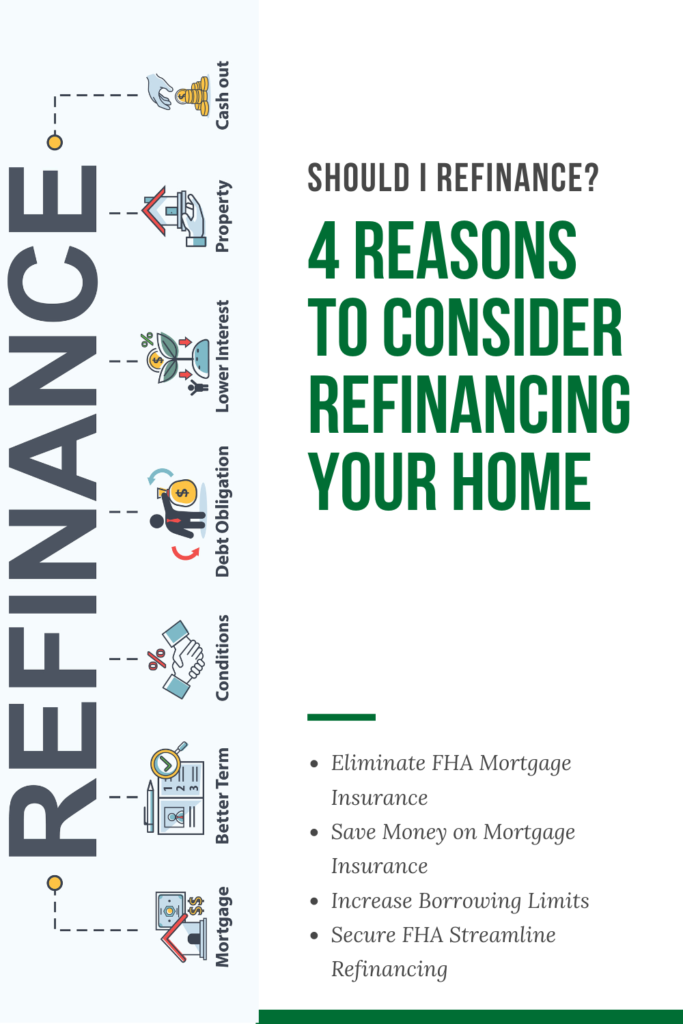FHA Refinance Rates
Like many homeowners, you’re probably eager to know the best options available to help pay
for your home. One question that many homeowners have is whether they should refinance
FHA loans Las Vegas to conventional loans. While FHA loans have some favorable aspects for
homeowners, refinancing a loan is also beneficial for many reasons. To help you make a sound
decision, we’ve provided a guide on FHA loans, conventional loans, and the advantages that
refinancing may have for you.
 What is an FHA Loan?
What is an FHA Loan?
Federal Housing Administration (FHA) loans are specifically geared towards first-time home
buyers. They are government-backed loans administered by a government agency. You can
qualify for an FHA loan with a lower credit score than if you apply for a conventional loan,
which makes FHA loans appealing for more home buyers. In 2018, the FHA program allocated
over one million new loans to home buyers. Although the FHA does not lend finances directly, it
allocates loans through an FHA-approved lender. Along with assisting individuals with lower
credit scores, FHA loans have lower mortgage requirements than conventional loans. Usually, a
conventional loan requires a down payment of at least 20%. With an FHA loan, however, you
can put down a payment as low as 3.5% with a credit score of 580. Most conventional loans
require a minimal credit score of 620. Furthermore, borrowers who have a credit score as low
as 500 can secure an FHA loan with a down payment of 10%.
What is a Conventional Loan?
Unlike an FHA loan, a conventional loan is not backed by a government agency. Most
conventional mortgages Las Vegas have fixed terms and rates. They are divided into two
categories, which are “conforming” and “non-conforming.” Conforming loans adhere to
requirements established by Fannie Mae and Freddie Mac. Non-conforming loans, as the name
implies, are loans that do not adhere to government-sponsored entity (GTE) guidelines.
Conventional loans are also available to home buyers with lower credit scores. However, those
loans generally have higher interest rates. They are referred to as “sub-prime” mortgages.
Is it Time to Refinance?
Once you’ve secured an FHA loan, you might wonder when – and if – you should consider
refinancing down the road. When you become a homeowner, you may receive several
solicitations to refinance your home. Naturally, you wonder if it’s a good idea to do so, or if
you’re just dealing with marketing pressures! As it turns out, there are actually multiple reasons
to refinance your mortgage. One of the main reasons is that you can change your current
interest rate to a new and lower rate available through the market. Refinancing also allows you
to tap into some of your equity in a tactic called “cash-out refinance.” This method will enable
you to borrow more money than what you owe on your current mortgage. In doing so, you’ll
receive a lump sum cash payment that you can put towards other expenses such as financing
home repairs and paying off any outstanding debts.
If these situations sound familiar (or desirable), it’s time to ask the best Las Vegas mortgage
brokers about your options.
 Good Reasons to Refinance
Good Reasons to Refinance
Once you’ve determined that it may be time to consider refinancing, experts offer several
concrete benefits to making the switch. This includes:
• Eliminate FHA mortgage insurance
• Save money on mortgage insurance
• Increase borrowing limits
• Secure FHA streamline refinancing
One good reason to refinance is that you can eliminate FHA mortgage insurance by switching
to a conventional loan. Signing up for an FHA loan means that while you can qualify for a lower
down payment and you can get a loan with a lower credit score, you also need to take out
mortgage insurance. This covers a lender in case you default on your loan, as the FHA assumes
substantial risks by lending money to borrowers with lower credit scores. The additional fees
for mortgage insurance are added to your total loan amount and your monthly payment.
Switching to a conventional loan, however, eliminates those mortgage insurance payments.
Secondly, you have the opportunity to save money on mortgage insurance by transitioning to a
conventional loan. You can still refinance even if you don’t have a 20% equity. However, you
still could benefit from having private mortgage insurance, provided you have good credit
scores that meet a conventional loan’s minimum criteria. Refinancing can save you the $3,500
upfront premium payment, which is a substantial volume initially, along with the monthly
mortgage insurance payments. Throughout the loan, these savings add up significantly.
Another reason to consider refinancing is that you can increase your borrowing limits. An FHA
loan limit is calculated on several factors, including where you live and your home’s initial value.
If your home value has risen substantially since you purchased it, you may be limited by an FHA
loan limit. Sometimes, switching to conventional mortgages Las Vegas can increase your loan
limits by $100,000 or more! Keep in mind, however, that even if you raise the ceiling on your
loan limits with a conventional loan, you’ll still be limited by maximum loan limits in the area
where you live. (Here is a guide for first time homebuyers.)
When you take out an FHA loan, you must wait at least 210 days from the time you got your loan to the time that you refinance on a streamline loan. This helps prevent mortgage lenders from engaging in a technique called “churning.” Churning is a scheme where the initial loan is refinanced multiple times in a short time period. This gives the lender commissions on every closed loan. It provides the borrower little or no benefit, and can even cause harm by preventing the borrower from gaining equity and restarting the loan’s time period with each closure. Since a conventional loan does not have a waiting period to refinance, you are free
from the danger of churning.
If you’re a first-time homebuyer, there are many advantages to refinancing your FHA loans.
The best Las Vegas mortgage brokers can help you determine if you’re eligible for switching and
whether or not it makes sense to do so. Contact us today to learn more about the opportunities
available and make the change.










